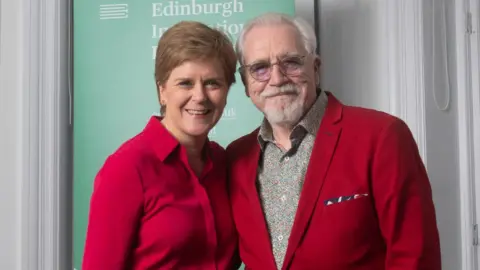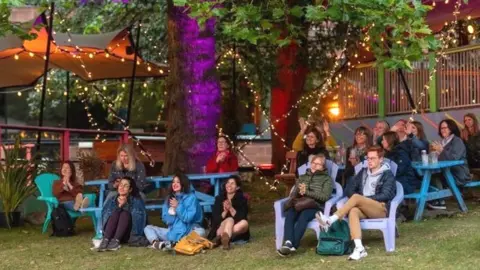Edinburgh International Book Festival reports strong ticket sales
 Getty Images
Getty ImagesEdinburgh International Book Festival has announced sales of 100,000 tickets for this year's event.
The programme included 600 events - a third fewer than 2019 - with 200 streamed online and available on demand for the rest of the year.
Guest speakers at Monday's closing night event included First Minister Nicola Sturgeon, actor Brian Cox and writer Irvine Welsh.
Organisers said there had been a significant shift in booking behaviour.
Festival director Nick Barley reported that more people than ever booked on the day, while free events, an outdoor screen and "pay what you can" ticket prices had allowed them to attract a new and diverse audience.
"This year was always going to be a bit of an unknown," Mr Barley said.
"But an overwhelmingly positive response from audiences old and new, local residents, festival goers and individuals from every corner of the world has made it an absolute joy to deliver.
"We are under no illusions that this is only the beginning of our build-back journey, and our focus now is to consolidate and respond to what we've learned from the year as we plan our return to the Edinburgh College of Art."
 Edinburgh International Book Festival
Edinburgh International Book FestivalThe Edinburgh Fringe issued more than 2.2 million tickets - the sixth highest figure in the event's 75-year history.
Although the overall tally was around 25% down on the 2019 figure, there were fewer shows and venues.
Ticket sales varied enormously across the Fringe's 273 venues. Some, like Assembly, Gilded Balloon, Pleasance and Underbelly, were 25% down on 2019 sales.
Others offered smaller programmes.
Summerhall presented 30% fewer shows, but were only down 7% at the box office, compared with 2019.
Fringe Producer Tom Forster said artists presenting "brave and bold work" at the venue had "won multiple awards".
"This reduced programme - leaning into the idea of building back better - does also mean, on balance, more tickets sold for each show across the venue," he said.
Affordable accommodation
Others like TheSpaceUK presented the same number of shows as 2019. It sold 165,000 tickets, compared with 174,000 in 2019, representing a 3% fall.
The organisation's artistic director, Charles Pamment, said sensible ticketing prices, extensive media and marketing support and being one of the few venues to return in 2021 with a full programme "meant that strong relationships with audiences and artists have continued to develop positively".
The Edinburgh International Festival said last year's outdoor programme, which was largely attended by locals, had helped organisers return to a bigger programme inside their regular venues like the Usher Hall and the Playhouse.
They offered 92 events this year, compared with 155 in 2019, and distributed 150,000 tickets - including 34,000 for free shows - which was around 7% down.
All the summer festivals had to contend with the ongoing challenges of the coronavirus pandemic and the rising cost of living.
Affordable accommodation was deemed the most pressing issue for the future and, according to some operators, "a major threat for everyone involved in the festival".
Shona McCarthy, chief executive of the Fringe Society, said this year's festival was "the first step" on a long road towards recovery and renewal.
"The hard work of thousands of artists, and hundreds of venues, producers and staff has combined to deliver the 75th anniversary festival during one of the most challenging summers on record," she added.
"We recognise the significant amount of work that is still required to support the long-term sustainability of this phenomenal festival.
"As we review and discuss all the learnings from this year, our focus this autumn will be on planning for the 2023 Edinburgh Fringe."
